| Listing 1 - 9 of 9 |
Sort by
|
Book
ISBN: 9789004514102 9789004514096 Year: 2022 Publisher: Leiden ;Boston Brill
Abstract | Keywords | Export | Availability | Bookmark
 Loading...
Loading...Choose an application
- Reference Manager
- EndNote
- RefWorks (Direct export to RefWorks)
In Suhrawardī’s Illuminationism, Jari Kaukua offers a new interpretation of Shihāb al-Dīn al-Suhrawardī’s (d. 1191 CE) illuminationist ( ishrāqī ) philosophy. Commonly portrayed as a philosophically inclined mystic, Suhrawardī appears here as a perspicacious critic of Avicenna who developed his critique into an alternative philosophical system. Focusing on metaphysics and theory of science, Kaukua argues that Suhrawardī’s illuminationist philosophy combines rigorous metaphysical monism with a modest but positive assessment of scientific explanation. This philosophical core of Suhrawardī’s illuminationism is reconcilable with but independent of the mystical side of the shaykh al-ishrāq.
Philosophy, Medieval. --- Theology. --- Philosophy. --- Suhrawardī, Yaḥyá ibn Ḥabash,
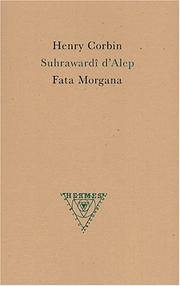
ISBN: 2851945394 Year: 2001 Volume: 21 Publisher: S.l. : Fata morgana,
Abstract | Keywords | Export | Availability | Bookmark
 Loading...
Loading...Choose an application
- Reference Manager
- EndNote
- RefWorks (Direct export to RefWorks)
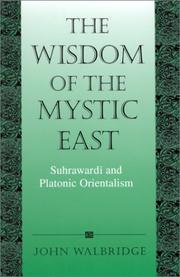
ISBN: 079145052X 9780791450529 Year: 2001 Publisher: New York: State university of New York press,
Abstract | Keywords | Export | Availability | Bookmark
 Loading...
Loading...Choose an application
- Reference Manager
- EndNote
- RefWorks (Direct export to RefWorks)
An expert on the thought if medieval Islamic philosopher Suhrawardi argues that philosophers have romanticized this work as a revival of oriental wisdom.
Book
ISBN: 1555401422 Year: 1990 Publisher: Atlanta Scholars Press
Abstract | Keywords | Export | Availability | Bookmark
 Loading...
Loading...Choose an application
- Reference Manager
- EndNote
- RefWorks (Direct export to RefWorks)
Ishrāqīyah --- Jewish philosophy --- Philosophy, Medieval --- Suhrawardī, Yaḥyá ibn Ḥabash,
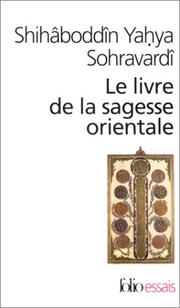
ISBN: 2070427218 9782070427215 Year: 2003 Volume: 416 Publisher: Paris: Gallimard,
Abstract | Keywords | Export | Availability | Bookmark
 Loading...
Loading...Choose an application
- Reference Manager
- EndNote
- RefWorks (Direct export to RefWorks)
Voici, sans conteste, un des monuments de la philosophie en terre d'islam : le chef-d'œuvre de Sohravardî, mort à Alep, à l'âge de trente-six ans, victime de l'intolérance, en 587/1191. Il exprime une expérience extatique de Dieu, " Lumière des Lumières ", dévoile dans l'univers sensible les multiples miroirs des intelligences et des Âmes. Il ressuscite la sagesse de l'Iran zoroastrien et, fidèle au platonisme, fonde en métaphysique le sentiment gnostique de la vie : la Ténèbre, les substances qui " portent en elles nuit et mort " s'opposent aux Lumières angéliques. Cette philosophie dramatique de l'existence s'achève en un magnifique chant de l'âme, en l'une des plus puissantes théories de la béatitude. Le lecteur trouvera ici, en outre, les deux commentaires qu'en ont fait Qotboddîn Shîrâzî (VIIe/XIIIe s.) et Mollâ Sadrâ Shîrâzî (XIe/XVlle s.), lui-même le plus grand philosophe du shî'isme iranien.
Mysticism --- Islamic philosophy --- Mysticisme --- Philosophie islamique --- Islam --- Suhrawardi, Yahyã ibn Habash, --- Suhrawardī, Yaḥyá ibn Ḥabash,
Book
ISBN: 9789004527744 9789004523715 Year: 2023 Publisher: Leiden ;Boston Brill
Abstract | Keywords | Export | Availability | Bookmark
 Loading...
Loading...Choose an application
- Reference Manager
- EndNote
- RefWorks (Direct export to RefWorks)
Tianyi Zhang offers in this study an innovative philosophical reconstruction of Shihāb al-Dīn al-Suhrawardī’s (d. 1191) Illuminationism. Commonly portrayed as either a theosophist or an Avicennian in disguise, Suhrawardī appears here as an original and hardheaded philosopher who adopts mysticism as a tool for philosophical investigation. Zhang makes use of Plato’s cave allegory to explain Suhrawardī’s Illuminationist project. Focusing on three areas—the theory of presential knowledge, the ontological discussion of mental considerations, and Light Metaphysics—Zhang convincingly reveals the Nominalist and Existential nature of Illuminationism and thereby proposes a new way of understanding how Suhrawardī’s central philosophical ideas cohere.
Law --- Jus gentium (Roman law) --- Humanism --- Natural law --- Roman influences. --- History --- Suhrawardī, Yaḥyá ibn Ḥabash, --- Roman influences. .
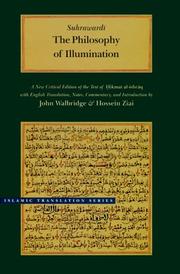
ISBN: 0842524576 9780842524575 Year: 1999 Publisher: Provo (Utah) : Brigham Young university press,
Abstract | Keywords | Export | Availability | Bookmark
 Loading...
Loading...Choose an application
- Reference Manager
- EndNote
- RefWorks (Direct export to RefWorks)
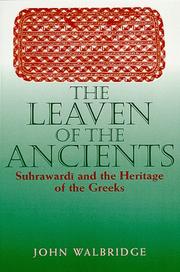
ISBN: 0791443590 0791443604 9780791443606 Year: 1999 Publisher: New York: State university of New York press,
Abstract | Keywords | Export | Availability | Bookmark
 Loading...
Loading...Choose an application
- Reference Manager
- EndNote
- RefWorks (Direct export to RefWorks)
The twelfth-century Persian philosopher Suhrawardi was the key figure in the transition of Islamic philosophy from the neo-Aristotelianism of Avicenna to the mystically oriented Islamic philosophy of later centuries. Suhrawardi's "Illuminationist" philosophy was a vigorous reassertion of Neoplatonism at a time when Sufism was becoming a major presence in Islamic thought and society. This book traces the intellectual background of Suhrawardi's thought and of the Greek roots of non-Aristotelian philosophy in the Islamic world. Suhrawardi placed himself in an intellectual tradition that sprang from the "Ancients," the philosophical and mystical tradition of Hermes Trismegistus and his successors in both Greece and the Orient. The author argues that Suhrawardi typifies an approach to philosophy characteristic of Neoplatonism, in which Pythagoras is the key pre-Socratic, Plato is the central figure in the history of philosophy, Aristotle is respected but corrected by reference to Pythagoras and Plato, and philosophy is ultimately an eclectic revelation known symbolically by different nations. Mystical intuition is a key philosophical tool and symbolism is of particular importance. The Leaven of the Ancients provides a translation of Suhrawardi's famous dream, in which Aristotle reveals the epistemological foundations of Suhrawardi's Illuminationist system. The book also analyzes the role played by Suhrawardi and his approach to philosophy in turning Islamic civilization away from physical science toward a subtle mystical psychology, thus offering a new explanation for the decline of science in Islam.
Book
ISBN: 2130534848 9782130534846 Year: 2003 Volume: *6 Publisher: Paris: PUF,
Abstract | Keywords | Export | Availability | Bookmark
 Loading...
Loading...Choose an application
- Reference Manager
- EndNote
- RefWorks (Direct export to RefWorks)
East and West --- Neoplatonism --- Islamic philosophy --- Philosophy, Arab --- Philosophy, Renaissance --- Baqlī, Rūzbihān ibn Abī al-Naṣr, --- Nicholas, --- Ficino, Marsilio, --- Bruno, Giordano, --- Pico della Mirandola, Giovanni, --- Suhrawardī, Yaḥyá ibn Ḥabash, --- Ibn al-ʻArabī, --- Qur'an --- Hermeneutics --- Philosophy and Contemporary World - 21st Century --- Ibn al-ʿArabī, --- Islamic philosophy - Iran --- Baqlī, Rūzbihān ibn Abī al-Naṣr, - -1209 or 1210 --- Nicholas, - of Cusa, Cardinal, - 1401-1464 --- Ficino, Marsilio, - 1433-1499 --- Bruno, Giordano, - 1548-1600 --- Pico della Mirandola, Giovanni, - 1463-1494 --- Suhrawardī, Yaḥyá ibn Ḥabash, - 1152 or 1153-1191 --- Ibn al-ʿArabī, - 1165-1240
| Listing 1 - 9 of 9 |
Sort by
|

 Search
Search Feedback
Feedback About UniCat
About UniCat  Help
Help News
News